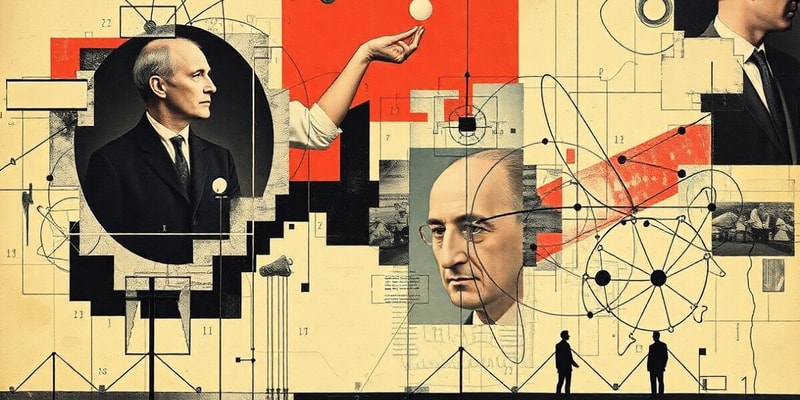Podcast
Questions and Answers
Which law of motion states that every action has an equal and opposite reaction?
Which law of motion states that every action has an equal and opposite reaction?
What is the formula for calculating power in physics?
What is the formula for calculating power in physics?
Which of the following is true according to the First Law of Thermodynamics?
Which of the following is true according to the First Law of Thermodynamics?
What type of energy is associated with the motion of an object?
What type of energy is associated with the motion of an object?
Signup and view all the answers
According to Ohm's Law, how are voltage, current, and resistance related?
According to Ohm's Law, how are voltage, current, and resistance related?
Signup and view all the answers
Which principle states that energy tends to disperse and systems tend to move towards disorder?
Which principle states that energy tends to disperse and systems tend to move towards disorder?
Signup and view all the answers
What is the unit of force in the SI system?
What is the unit of force in the SI system?
Signup and view all the answers
Which phenomenon describes the bending of light when it passes from one medium to another?
Which phenomenon describes the bending of light when it passes from one medium to another?
Signup and view all the answers
Study Notes
Overview of Physics
- Definition: The study of matter, energy, and the interactions between them.
-
Branches:
- Classical Mechanics
- Electromagnetism
- Thermodynamics
- Quantum Mechanics
- Relativity
- Optics
Fundamental Concepts
-
Motion:
- Displacement, velocity, acceleration
- Newton's Laws of Motion
- First: Inertia
- Second: F=ma (Force = mass x acceleration)
- Third: Action-reaction
-
Forces:
- Types: gravitational, electromagnetic, nuclear, friction
- Concepts: net force, tension, normal force
-
Energy:
- Types: kinetic, potential, thermal, chemical
- Conservation of Energy principle
-
Work and Power:
- Work = force x displacement (in direction of force)
- Power = work done / time taken
Thermodynamics
-
Laws of Thermodynamics:
- Zeroth: Thermal equilibrium
- First: Energy conservation
- Second: Entropy and heat transfer
- Third: Absolute zero
Waves and Optics
-
Wave Properties:
- Wavelength, frequency, amplitude, speed
- Types: mechanical, electromagnetic
-
Light:
- Reflection, refraction, diffraction
- Wave-particle duality
Electricity and Magnetism
-
Electricity:
- Charge, current, voltage, resistance
- Ohm's Law: V = IR
-
Magnetism:
- Magnetic fields, forces on charged particles
- Electromagnetic induction
Quantum Mechanics
-
Key Concepts:
- Wave function, uncertainty principle
- Quantum states and superposition
- Particle-wave duality
Relativity
-
Special Relativity:
- Time dilation, length contraction
- Mass-energy equivalence (E=mc²)
-
General Relativity:
- Gravitational fields and curvature of spacetime
Important Units and Measurements
-
SI Units:
- Length: meter (m)
- Mass: kilogram (kg)
- Time: second (s)
- Force: newton (N)
- Energy: joule (J)
Applications of Physics
- Engineering, technology, medicine, environmental science, astrophysics
Key Figures in Physics
- Isaac Newton, Albert Einstein, James Clerk Maxwell, Niels Bohr, Richard Feynman
Study Tips
- Understand concepts visually (draw diagrams or use simulations).
- Solve practice problems regularly.
- Relate concepts to real-world phenomena for better retention.
Overview of Physics
- Physics studies matter, energy, and how they interact.
- Major branches include classical mechanics, electromagnetism, thermodynamics, quantum mechanics, relativity, and optics.
Fundamental Concepts
-
Motion: Describes changes in an object's position over time.
- Concepts include displacement, velocity, acceleration.
- Governed by Newton's Laws of Motion.
- First Law: Inertia - object at rest stays at rest, object in motion stays in motion at a constant velocity unless acted upon by a force.
- Second Law: F = ma (Force equals mass times acceleration).
- Third Law: Every action has an equal and opposite reaction.
-
Forces: Push or pulls that can change an object's motion.
- Types: gravitational, electromagnetic, nuclear, friction.
- Concepts: net force, tension, normal force.
-
Energy: The ability to do work.
- Types: kinetic (motion), potential (stored), thermal (heat), chemical (bonds).
- Conserved: Energy cannot be created or destroyed, only transformed from one form to another.
-
Work and Power: Related to the transfer of energy.
- Work is done when a force is applied over a distance, calculated as force × displacement in the direction of the force.
- Power is the rate at which work is done, calculated as work done over time.
Thermodynamics
- Study of heat and its relation to other forms of energy.
- Four Laws of Thermodynamics:
- Zeroth Law: Thermal equilibrium occurs when two objects in contact have the same temperature.
- First Law: Energy is conserved, it can be transferred but not created or destroyed.
- Second Law: Entropy always increases in an isolated system, heat flows from hot to cold.
- Third Law: Absolute zero (0 Kelvin) is the lowest possible temperature, unattainable in reality.
Waves and Optics
-
Waves: Disturbances that transmit energy through a medium.
- Key properties: wavelength (distance between crests), frequency (number of waves per second), amplitude (height of the wave), speed (how fast it travels).
- Types: Mechanical waves require a medium (sound waves) while electromagnetic waves don't (light waves).
-
Light: A form of electromagnetic radiation that travels in waves and exhibits wave-like properties.
- Can be reflected, refracted (bent), and diffracted (spread out).
- Exhibits wave-particle duality: Behaves like waves and particles.
Electricity and Magnetism
-
Electricity: Study of charge, current, voltage, and resistance.
- Charge is a fundamental property of matter.
- Current is the flow of charge.
- Voltage is the potential difference that drives the flow of charge.
- Resistance restricts the flow of current.
- Ohm's Law: V = IR (voltage equals current times resistance).
-
Magnetism: Deals with forces caused by magnets and electric currents.
- Magnetic fields are created by moving charges or magnets.
- These fields exert force on charged particles.
- Electromagnetic induction: changing magnetic fields can induce electric currents.
Quantum Mechanics
-
Quantum Mechanics: Deals with the behavior of matter and energy at the atomic and subatomic levels.
- Fundamental concepts:
- Wave function: a mathematical description of the state of a quantum system.
- Uncertainty principle: impossible to know both the position and momentum of a particle with absolute certainty.
- Quantum states and superposition: particles can exist in multiple states simultaneously.
- Particle-wave duality: light and matter can act both as waves and particles.
- Fundamental concepts:
Relativity
-
Special Relativity: Deals with the relationship between space and time, and how they are affected by motion.
- Key concepts:
- Time dilation: time slows down for objects traveling at high speeds relative to an observer.
- Length contraction: length of an object appears shorter to an observer moving relative to it.
- Mass-energy equivalence: E = mc2 , energy and mass are interchangeable.
- Key concepts:
- General Relativity: Describes gravity as a consequence of the curvature of space-time.
Important Units and Measurements
-
SI Units: the standard system of units used in science.
- Length: meter (m)
- Mass: kilogram (kg)
- Time: second (s)
- Force: newton (N)
- Energy: joule (J)
Applications of Physics
- Physics principles are essential for many fields:
- Engineering: designing structures, machines, and systems.
- Technology: developing new technologies, such as computers, communication devices, and medical equipment.
- Medicine: medical imaging, radiation therapy, and drug development.
- Environmental science: understanding climate change, energy resources, and pollution.
- Astrophysics: studying the universe and its celestial objects.
Key Figures in Physics
- Newton: laid the foundation for classical mechanics and optics.
- Einstein: developed the theories of relativity, revolutionized our understanding of space, time, gravity, and the universe.
- Maxwell: unified electricity and magnetism into a single theory.
- Bohr: developed the model of the atom.
- Feynman: made significant contributions to quantum electrodynamics and other areas of physics.
Study Tips
- Use visuals: Draw diagrams, use simulations or animations to visualize concepts.
- Practice problems regularly: Work on exercises to solidify your understanding.
- Connect to the real world: Relate concepts to everyday phenomena to make them easier to remember.
Studying That Suits You
Use AI to generate personalized quizzes and flashcards to suit your learning preferences.
Description
This quiz provides an overview of physics, exploring the fundamental concepts of motion, forces, energy, and thermodynamics. It also covers key topics such as Newton's Laws of Motion, the types of energy, and the laws governing thermodynamics. Test your knowledge on the various branches of physics and the principles that govern them.




